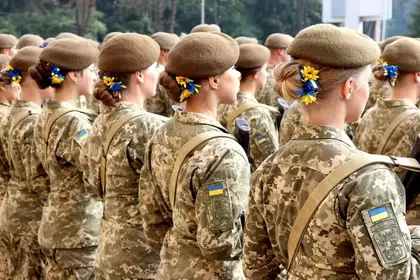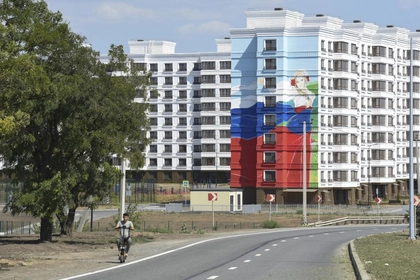As the Russian army struggles to replace its huge manpower losses arising from its war in Ukraine, it turned to mobilizing the medically unfit, the middle-aged, those with no previous military experience and convicts.
These recruits had one thing in common – they were all men. One “person-power” resource the Kremlin has yet to tap is women, but that may be changing.
JOIN US ON TELEGRAM
Follow our coverage of the war on the @Kyivpost_official.
The number of women serving in the Ukrainian military increased by about 40 percent following Russia’s full-scale invasion and the age limits for female recruits, was raised from 40 to 60, the same as for men.
Initially restricted to traditional female roles such as nurses and rear echelon radio operators, gradually, after the February 2022 invasion, the Ukraine government introduced rules that allowed women to drive trucks in combat zones, to serve in the infantry as drone operators, machine gunners, or snipers, to become tank commanders and in Ukraine’s special forces. Women have been deployed on combat operations in southeastern Ukraine for several months.
Women in Putin’s Russia were expected to be loyal wives and mothers, keeping the home fires burning and providing emotional and practical support to their menfolk who were sent to war.
The almost total absence of women from the Armed Forces is in line with the belief that a resilient state is found on strength, masculinity, toughness, ruthlessness and the use of force to achieve its political aims.

Ukraine Conducts Attack with Solely UGVs and FPV Drones, Destroying Russian Positions
In Russia every walk of life is male dominated but particularly its armed forces, security services and politics. This contrasts sharply with Soviet forces during WWII when large numbers of women were deployed in combat roles, particularly as snipers.
In March, the Russian Defense Minister, Sergei Shoigu, said that around 1,100 women were serving in Russia’s military in Ukraine, from a total of around 39,000 – 0.3 percent of its strength. These were mainly nurses, cooks and other support staff.
There only exceptions seemed to be, according to the Russian investigative site Vazhnye Istorii, that reported around the same time as Shoigu was speaking, Moscow was recruiting female prisoners for battlefield deployment in Donetsk, citing the Russian NGO Russia Behind Bars.
In July there were reports that Russia’s Defense Ministry had launched a recruitment campaign targeting women for roles as doctors, nurses and cooks in the military, with possible deployment in occupied Ukraine.
A Russian mercenary group may be leading the way in changing that as it is attempting to recruit women for combat roles in Ukraine, according to a UK Defence Intelligence update on Oct. 30 which confirmed reports a week earlier that the so-called “Borz Battalion” of the Redut, mercenary group was posting adverts for women to fill combat roles in Ukraine on the Russian VKontakte social media site.
Vazhnye Istorii reported that Redut was offering a full month of training and an initial six-month contract after which individuals would be given the status of a combat veteran. It indicated a salary of RUB 220,000 ($2,200) with insurance cover for injury of RUB 1-3 million (S10,000-30,000), and RUB 5 million ($50,000) for death. It said it was looking to employ women as snipers and drone operators, with preference for those with weapon handling skills.
Redut, which many see as the Kremlin’s choice to replace Wagner as the pre-eminent private military company is thought to have close links with Russia’s Defense Ministry, in general, and the GRU military intelligence directorate in particular, which is believed to use the PMC to recruit on its behalf.
The name Borz is taken from the Chechen word for wolf and was the name given to an Ichkerian special forces unit which fought against Russian troops during the wars in Chechnya. Strangely enough the same name is used by a unit of ethnic Chechens serving with the Ukrainian Armed Forces (AFU).
Whether or not this trickle of recruiting Russian womanhood into the military becomes a flood waits to be seen. What it does show, according to Cynthia Enloe, a US expert in international relations, is that:
“The absence of women soldiers among the Russian troops fighting in Ukraine is an important symbol of Moscow’s reputation as a bastion of traditional values, and reflects the social order that Putin seeks to impose on Ukrainians.
“The presence of women soldiers among the Ukrainian troops fighting to defend their country against Russia’s invasion is an important symbol of the nature of the postwar society that Ukraine’s ordinary citizens, both men and women, will build together.”
You can also highlight the text and press Ctrl + Enter






